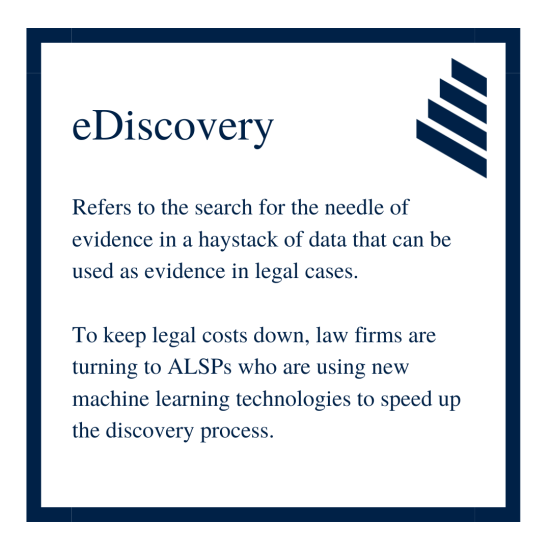Legal service delivery is changing - it’s not just big law firms that are servicing corporations anymore. In the past two decades or so, they have been joined by alternative legal service providers (ALSPs), including the Big Four accounting firms.
ALSPs are challenging the supremacy and business model of traditional legal firms, as they expand the range of services that they offer. ALSPs first emerged in the late 1990s and early 2000s. Back then, they mostly focused on taking on outsourced legal support work, priced cheaply, in regions such as India. The name of the game was cost arbitrage, with ALSPs looking to boost efficiency and keep a lid on costs for their clients - who are both the in-house legal departments of companies and law firms themselves.
The legal service industry today looks very different indeed. ALSPs have moved up the value chain and are now recognised as strategic business partners, and seen as capable of becoming full-service legal providers. ALSPs have evolved to offer a wide array of integrated solutions, from consulting for legal technology to data analytics and cloud computing. Some are even offering legal advice, which has traditionally been the preserve of law firms. The boundaries between law firms, ALSPs and corporate legal departments are becoming increasingly blurred.
The evolution of ALSPs is reflected in the fourth biennial Alternative Legal Services Providers 2023 Report, produced by Saïd Business School, the Thomson Reuters Institute, and the Center on Ethics and the Legal Profession at Georgetown Law. The report shows ALSPs now command a $20.6 billion corner of the legal services industry - and their growth is accelerating dramatically.
The compound annual growth rate was 20% between 2019-21, compared with 15% between 2017-19. What has driven the growth in use of ALSPs? Law firms mostly use these alternative providers for 'eDiscovery', which refers to the search for the needle of evidence in a haystack of data that can be used as evidence in legal cases. To keep legal costs down, law firms are turning to ALSPs who are using new machine learning technologies to speed up the discovery process.

For example, by crunching a wide range of digital communications, such as emails and text messages, this new tech can recognise linguistic patterns and sentiments much faster than a human lawyer can.
Law firms also value ALSPs for their specialised expertise, which can help them more rapidly adopt technologies that can enable them to offer legal services with greater scale and efficiency. ALSPs not only help law firms identify and implement the right technology solutions, they may also provide training and support.
But there are also signs of competition, with big law firms having set up their own ALSPs to complement their core legal advisory businesses. Additionally, law firms may risk being disintermediated, as corporate law departments - their core client base - choose, in some cases, to divert some of their legal spending to ALSPs, provided they can bring all their offerings together in an integrated solution.
The Big Four accountancy firms are best placed to compete with law firms, because of their scale. This means they can combine legal advice with tax and consulting services, becoming a one-stop shop for corporate legal teams. However, the Big Four - along with other ALSPs - have yet to truly corner the legal market or dislodge the leading law firms.
While spend on ALSPs is expanding rapidly, it remains a drop in the ocean compared with the overall size of the legal market. Estimates vary, but one source put the global legal market at nearly $902 billion in 2021. That means ALSPs currently attract just 2% of overall legal spending.
If the ALSPs are going to take a bigger slice of that pie, they are going to need to become multi-disciplinary service providers. Corporate legal teams are mostly tapping into the specialist expertise of ALSPs, with regulatory risk and compliance, as well as legal research, the top two use cases. Those ALSPs which can combine these services, along with eDiscovery and technology consulting, are in pole position to unseat the incumbent law firms.
Scale is also going to determine who the winners and losers are in the near future.
Scale is also going to determine who the winners and losers are in the near future. The Big Four have substantial resources which they can draw upon - but so do the big cloud storage providers such as Amazon, Microsoft and IBM. If these tech giants were to curate a network of specialist legal providers, they could build a legal technology ecosystem that would rival the largest global law firms.
Amazon, for one, has already launched an intellectual property (IP) accelerator programme in Europe, to help companies protect their brands and tackle counterfeit goods. The accelerator connects businesses to IP law firms. It’s not yet clear if this represents the first step of Amazon’s full-blow entry into the legal industry, but the possibilities are immense.
Moreover, ALSPs will face tough competition if law firms exploit the potential of generative AI within the firm. Allen & Overy’s announcement of Harvey (based on GPT-3) in February 2023, and more recent launches of GPT-4 and Google’s chatbot Bard are signs of things to come, as junior lawyers rely increasingly on these tools to generate legal texts and answers to legal questions.




